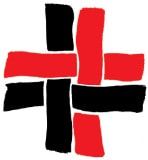For more than forty years, my engagement with the grape has begun at a later stage: when the wine has some bottle age. But, courtesy of Amy and Matt at La Gramière, Jill and I have the opportunity to get our hands dirty out in the vineyards, treading in the footsteps of the Greeks and the Romans, and generations of French peasants. It is a quite wonderful experience, and I can’t believe it is has taken until my seventh decade to take part in it.
These days, the majority of the grapes bound for the local co-operative is harvested mechanically. But La Gramìere is a small, garagiste producer: the picking is done by hand. Within a metre of the very first row of Grenache, the advantages of this are clear. The ripening has been uneven this year, and there are some grapes which are almost raisins – over-ripe; some have not ripened at all and are hard, white, tiny; still others are beginning to rot, the result of heavy rain last Sunday. The mechanical harvesters would suck up all of these indiscriminately and the resulting wine would suffer as a result.
Under Amy’s tutelage, we learn to inspect each bunch and remove each offending grape.I develop a rule of thumb: I’m going to drink this stuff in a couple of years; do I want that particular grape in the blend? If the answer is no, it goes out.
Quickly, the motley crew of American, Kiwi, British and French pickers establishes a routine, with healthy competition developing between rows. Late-comers are greeted with a cheery “Bonne après-midi!”. Matt drives his 1963 vintage Massey-Ferguson 35 tractor (a source of great interest to me as a biographer of Harry Ferguson himself) up and down the rows collecting the full boxes of grapes. The conversation and banter, so animated earlier, becomes more sporadic as backs began to ache. Then, the welfare of her workers always in mind, Amy calls a break.
We make our way to the bottom of the vineyard where a simple structure has been erected, with awnings to provide shade. Coffee – and even better, ice cold water - is provided. Amy’s mom has baked a cake, the deliciousness of which is an early sign of what we can expect for lunch. Statistically improbable though it is, I am the sole smoker, so I’m standing apart from the rest when a sanglier breaks cover and races across the vineyard. Even though our car was once hit by a wild boar as we drove across the garrigues at midnight, this is the first we have actually seen. It's an awesome sight.
Excitement over, we return to the picking. The sun is getting higher and hotter. We begin to understand how frustratingly complex this business really is. One can fill an entire bucket with grapes from a single vine, only to move to the next and find nothing. A bunch which feels so firm and immaculate in the hand is revealed to be rotten at its heart. But, overall, we are told, it is a good harvest in terms of both quality and quantity. That's good.
Lunch comes not a moment too soon, and it is a reminder that la vendange is also a social, celebratory event, a chance to meet fellow-pickers properly, to discuss la vie Francaise, and to find common ground: eating out, wine, and contemporary fiction are a good start with this particular group. Under the awnings, a long table has been laid, decorated by vine leaves. There are wondrous salads and meats and desserts, but best of all for someone with my priorities and preference for liquid lunches, there is a coolbox filled with beers and previous vintages of the excellent La Gramière wines. Over the three days, I taste all the reds from 2007 to 2010 – the latter having been bottled only a week ago and already showing the serious structure and chewiness (it’s charnu) that epitomizes the character of the domaine. The ’08 remains my preference, over the ’09, which Amy calls a ‘crowd-pleaser’: lots of delicious soft fruits, but they are all excellent. I’m more than happy to drink any or indeed all of them, including the whites and rosés which I have never tasted before.
The difference between these and everyday Co-op wines is marked, and if much of the superiority is the result of the skill of the vigneron, I like to think that the meticulous extraction of inferior grapes makes a contribution too – even if Amy refuses to make a special cuvée from the grapes that I picked personally.
The end of lunch marks the end of work for your correspondent. Three mornings of early starts and hard physical labour is not easy, even for a man of the earth like myself. So it is a pleasure to get home at the end of Day 3, and, with the Sox for once having a day off rather than yet another off-day, get into bed early and sleep through until after dawn.
We will make the most of the next couple of days. The Syrah is almost ripe – and “men must endure/ Their going hence, even as their coming hither:/ ripeness is all.”
Edgar was right. And I am ready for the call of the ripe Syrah, whenever it comes.
Today's listening: The Dylan/Cash Sessions from 1969: 'Yodel me one more time, Bob'.





 RSS Feed
RSS Feed